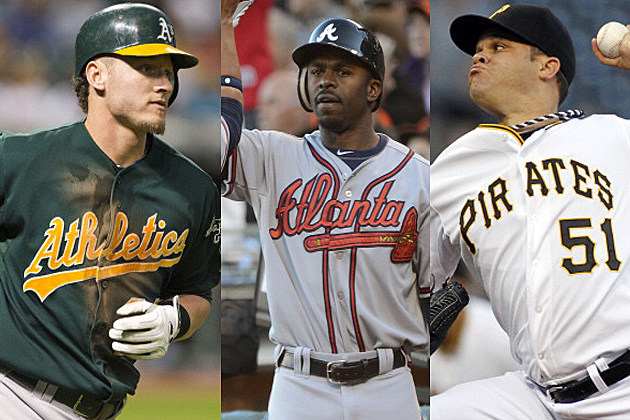Today's truly excellent guest post comes from Guest Blogger "Tim," whom I heartily thank for the obvious care and time he put into what you are about to read. -Alex
My thanks to Alex for the opportunity to discuss his recent post on price gouging. I want to make a minor point about transaction costs and then contemplate whether there is a moral rationale for price gouging. I argue that there is.
To reiterate a bit, the argument against gouging laws—the argument that would allow gouging, if you prefer—emphasizes a functional role on the part of prices. When the price goes up in response to scarce supply, it encourages good behavior. Gasoline producers (for one example) see an opportunity to profit and thus swoop in to disaster-stricken areas with their commodity in tow. Competitors see an opportunity to profit and soon follow. Citizens who live far from the disaster, for their part, observe the price of gas increase a bit and thus adjust their behavior at the margin to conserve, carpooling to work or buying a more fuel-efficient car. Self-interest is the driving force here, but it leads people to behave almost as if a benevolent dictator were guiding them. So the stylized argument goes.

Alex rightly notes that economic models that predict such happy (Panglossian?) results assume “frictionless” transactions. To continue the gasoline example, the assumption is that Chevron can shift its supply of gasoline around nimbly, without incurring extra costs. This assumption is violated to the extent Chevron’s oil trucks are in the wrong place at the wrong time, to the extent it can’t hire enough extra personnel to take on short term work, and any number of other imaginable circumstances. And it is violated when far-off consumers don’t instantly switch to more fuel-efficient cars, even if they would really prefer to. Alex’s consideration is important because, to the extent the assumption is violated (and it is certainly violated) the appealing consequences such models predict might not come to pass. How much is the no-friction assumption causing us to overstate the benefits of responsive prices?
I do not know how to quantify the answer to that question, but my impression is that it is easy to overstate transaction costs and underestimate how responsive firms can be. One fitting and illustrative example of impressive responsiveness comes from Hurricane Katrina. Steve Horwitz analyzes how private firms responded to the disaster and writes (citations omitted):
[Wal-Mart] uses its own hurricane-tracking software and has contracts with private forecasters for the latest information on storms. By Wednesday, August 24, five days before Katrina’s eventual landfall on the Gulf Coast, [its] command center had gone into planning mode, and two days later, when Katrina struck Florida, the complement of personnel in the command center exceeded fifty persons [up from six to ten].
Given the frequency of damaging hurricanes along the Gulf Coast and in Florida as well as the large number of stores Wal-Mart has in that area, the company has a well-rehearsed process for dealing with threatening storms. Central to that process is passing information down from the senior-management level to regional, district, and store managers. . . . The company moved emergency supplies such as generators, dry ice, and bottled water from their current warehouse locations “to designated staging areas so that company stores would be able to open quickly.” These staging areas were set up just outside the likely worst-hit areas to facilitate a quick response with minimal danger of damage. For example, a distribution center in Brookhaven, Mississippi, had forty-five trucks in place before Katrina’s landfall.
Once the storm had passed, the protocol directed district and store managers to relay information about store conditions back up the chain of command to the emergency operations center. Katrina had knocked out the company’s computerized inventory-management system in the areas it hit, not to mention much of the local phone infrastructure, so Wal-Mart associates and managers relied for the most part on satellite cell phones that its own loss-prevention teams brought in as early as Tuesday, the day after the storm. . . . Wal-Mart trucks with relief supplies were rolling into New Orleans on the day after the storm. (514-515)
Anecdotal, but a good example that moves tired tropes about dynamism of the free market out of the abstract. I suspect few people will argue that the Katrina aid not driven by economic incentives (i.e. FEMA’s efforts) would look favorable in comparison. (How much has FEMA improved?)
Admittedly, this point lacks some nuance. Of course, firms are nimble in some respects, and sclerotic in others. I will not dwell on the matter though, because as Alex notes, not much turns on how we answer the transaction cost question. As long as we think of the market as augmenting charity where charity has failed, rather than as an excuse not to engage in charity, the transaction cost matter is no reason to arrest moving prices. (We can think of charitable giving as upward pressure of supply and thus downward pressure on price. To the extent charity solves people’s problems, the opportunities to price gouge—even if one wanted to—vanish.)

There is a separate question—a moral one. Even if we agree that prices should be allowed to respond as they will, what do we think of the people who profit from the hardship of others? As Alex writes, “We hope that when faced with victims in need, we think only of how we can help, not of how we can use it to our advantage.” Or as another friend of mine put it, are price gougers not taking advantage of people? And are we not entitled to chastise them as such?
Perhaps, but I think the answer is not so straightforward. My reasons involve turning our attention away from the role that prices play in shaping incentives, and redirecting it toward a second function they can serve: transmitting information. And I think we need to consider carefully what a more magnanimous, kind-spirited, generous arrangement would look like. To explain more fully, please entertain a thought experiment.
Imagine yourself as a gasoline retailer in New Jersey after Hurricane Sandy has struck. Two days after the incident, you receive a small amount of gasoline, enough to fill just one hundred cars or so—not nearly enough to satisfy the line that has snaked out of your lot, around the block, and out of sight, one thousand cars at least. What do you do? More specifically, what would be a morally defensible decision rule for deciding who should get the gas?
Consider first the price-gouging alternative, which is, in implementation, an auction. You could incrementally raise the price from its pre-hurricane level of $4 per gallon. As you do, cars in line will turn away depending on how much gas they have in reserve, how much their plans rely on gas, how likely they think they are to find gas elsewhere, and other factors. You could keep the price going up to $5, $10, $15, and so on until only one hundred cars remain and you can meet demand fully.

The auction approach has some features to recommend it. It gives us both a defensible standard for who should get the gas—who values it most?—and a mechanism to figure out who those people are. (Who is willing to pay the most?) There are also some reasonable concerns about an auction. In particular, it seems to benefit the wealthy, who are less likely to balk at high prices.
One alternative that might seem more fair is to keep the price at $4 and simply sell gas to the first one hundred people in the line. After all, they got out of bed early and have been waiting in line for hours. Doesn’t this effort entitle them to the gas? And doesn’t this decision rule seem fair in that it is undertaken from behind the veil of ignorance (roughly speaking)? You didn’t decide who would be the first one hundred people in line.
On scrutiny, I think such reasoning proves faulty. In fact, the first-in-line rule is very much like the auction. Recall that the price of a good is not how much cash you turn over for it, but what you give up to get it. In this hypothetical, the first one hundred people in line are giving up $4 per gallon for gas, but they also gave up time trolling neighborhoods for working gas stations, or just waiting in their cars. This opportunity cost could easily bring the true price they are paying up to the $15 per gallon possibility we entertained above. To remember this fact highlights a certain folly in trying to control a price. You can limit how much green stuff trades hands, but it is rather more difficult to limit how much people will pay for the things they value. Limit their ability to pay in dollars, and they are likely to pay in other ways—in this case wasteful and inefficient ones. And the 101st-1,000th people in line paid something in terms of time, but got no gas in return.
Note also that the “paying” is doing a lot of work in making the first-in-line alternative seem even passably fair. If the first people in line aren’t giving something extra up for the gas, then all we’ve done is jettison a distribution standard—who values gasoline the most?—that, although perhaps flawed, was at least a real standard, and substitute something completely haphazard and arbitrary: who happened to be first in line? Surely the “value” standard is more morally defensible than a roll of the dice.
This brings us to a third decision rule we might entertain, which I shall call the merit approach. The aspiration here is to answer Alex’s call that we think about those in need and how we can help them. This is a laudable intention, but given the number of people in line, it faces an immediate obstacle: how are we to determine who is most in need? The dilemma is not trivial. Surely, if asked, many people in line—certainly more than one hundred—would make the case that they need the gas.
Perhaps we can take it upon ourselves to adjudicate their claims. Who would use the gas to run a generator that would preserve a child’s insulin (per the Zwolinski’s example in Alex’s post), and who would use it just to keep her computer running and connected to the Internet? Surely we should give the gas to the first person.
I think the merit approach faces three problems that are jointly insurmountable.
First, and rather prosaically, it would be difficult to determine what motivates each person’s desire to purchase gas. In our running example, it would require interviewing the one thousand people in line and asking what they will use the gas for—a question that it would behoove them to answer dishonestly. We can easily imagine scenarios in which the task will be more daunting.
Second, and more importantly, even if we had information about individual motives, it would be impossible to determine the broader effects of our choice. To do so would simply require too much information about individual circumstances. Return to the insulin / computer choice mentioned above. On its face, one of these uses seems to have more merit than the other, but we need more information to know for sure. We also need to know what substitutes are available. Does the insulin patient have a next-door neighbor with a working generator and refrigerator? Is there a relative on the way with a trunk full of gasoline containers? Either of these possibilities makes the insulin-preservation use less pressing.
More than just knowing about substitutes, to determine broader impact of our choice would also require knowledge about second, third, and fourth order effects. Consider again the person who wants gas to power her computer. Suppose she wants to get her website, which sells rubber o-rings, up and running again. This still seems to be a matter of secondary importance. But suppose furthermore that she is the region’s leading distributor of unusual o-ring sizes, and that the water pumps being sent to the area to help drain flooded homes require a size only she has in stock. All of a sudden it is easy to imagine the gasoline doing more good in her (profit-seeking!) hands than elsewhere.

The third consideration is the most subtle and abstract. It concerns the role of judgment. Suppose omniscience—that the information problems I engage above were to disappear. Even then, to allocate gasoline according to the merit approach, or anything like it, would require us at some level to make a determination about what use is more deserving than the others. It requires us to do so. How?
Whatever ethical theory we might employ—Rawlsian, utilitarian, Kantian, whatever—is sure not to be universally acceptable and, as such, would impose our value judgments on others. For us to take up this mantle is, I think, perhaps a small but insidious step down a problematic road, for it surrenders the moral high ground of liberty and pluralism in favor of—I’m not sure what to call it, but something where one person gets to impose his world view on others. For the case at hand, the concession is, admittedly, quite minor. But to the extent we wish to extrapolate from the present example and apply its logic to the grand business of governing on the large scale, it is a consideration that we should acknowledge. There are those who would say the concession is a step toward authoritarianism.
Bathed in these considerations, the “auction” approach looks far more attractive and, we might say, more moral. If we think about it as distributing resources according to an ethical theory, it is a very loose ethical theory and not one that elevates one individual’s judgment above others’. A quote from Hayek is fitting here: “Our problem is whether it is desirable that people should enjoy advantages in proportion to the benefits which their fellows derive from their activities [i.e. value, expressed through willingness to pay] or whether the distribution of these advantages should be based on other men’s views of their merits” (emphasis mine).
Importantly, the auction approach also goes far in solving the information problems. It removes the incentive to lie, since payment requires you to “put your money where your mouth is.” Furthermore, prices, when allowed to filter through a complex system, aggregate information about substitutes and second-order effects in a way that no purposeful investigation ever could. (This is the topic of a seminal article by Hayek.) To consumers who have substitutes available, as in the refrigerator-next-door example, individuals will value the gas less and therefore be willing to pay less for it. To the extent a person can use a commodity to generate greater social good, it will be more valuable to her and she will be willing to pay more for it, as in the o-ring example. Thus, we can think about the station attendant’s auction not so much as profit-seeking, but rather as answering a moral question that would otherwise be intractable: “How can I distribute my commodity such that it does the most good?” Then, the relevant consideration if we want to judge the gas station owner is not the extent to which he profited, but rather what he chooses to do with the profits. (Perhaps he turns around and donates his windfall to charity. Would anyone call his price gouging immoral in this case?)
Note that nowhere above have we seen a line of argumentation that I think is too often wielded in favor libertarian conclusions: the Randian emphasis on property rights and freedom of action for its own sake. I often find arguments along those lines too narrow in focus, often insensitive, and occasionally vulgar. The moral case for liberty can be made on friendlier, and more instrumental, grounds, as I have tried to do here.
It has been said that, when exchanges are genuinely voluntary, the only way to obtain the things you value is to help other people get the things they value. This notion is a sound basis for an economic system. Given how much of ethics is wrapped up in distribution—questions about who gets what—can it be a moral guide as well?






























